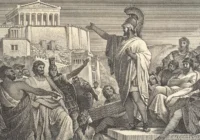The Minnesota Reporter describes a case of what is classically termed flip-flopping in United States politics. It concerns Rep. Angie Craig and 51 other Democrats, who in their majority have suddenly changed their opinion regarding a piece of legislation, HR9495, bearing the title: Stop Terror-Financing and Tax Penalties on American Hostages Act.
This legislation would allow the federal government to revoke tax-exempt status for any non-profit organizations it decides to qualify as “terrorist supporting.” We have recently witnessed numerous examples of politicians and the media figures claiming that individuals suspected of voicing pro-Palestinian sentiments are, by that very act of speech, active supporters of Hamas, an officially designated “terrorist organization.” It isn’t difficult to see how such a law in the hands of any government — Democrat, Republican or simply fascist — can be used to throttle free speech.
The Fair Observer team has good reason to worry about this bill, but for reasons other than those cited by the dozens of Democrats who have suddenly seen the light. Our journal’s vocation is to allow everyone — including ordinary citizens with strong feelings — to publish the widest variety of reasoned readings of the events of contemporary history. We systematically require that the facts be respected. But we know that the interpretation people may have of the same facts will vary according to the elements of context from which they view those facts. Allowing for the expression of contrasting appreciations helps all of us better understand our own perceptions. It also invites us to revise our own partial understanding of the issues.
Many people see the exercise of freedom of thought and speech as the foundation of democracy. Now, whether what we have today is a healthy democracy remains a matter of open debate. For most Americans, freedom of expression stands as the axiom on which the logic of democracy is built.
But what is HR9495? Here is the official summary of the bill’s intent:
“Legislation that would prevent U.S. citizens who have been
taken hostage or wrongfully detained abroad from incurring
penalties for late tax payments while they were held, as well
as terminating tax-exempt status for organizations found to
be supporting terrorism.”
So why would Democrats even be tempted to flip-flop on such a question?
The Minnesota Reformer reports that “Minnesota Rep. Angie Craig voted in favor of the legislation last week, one of 52 House Democrats — and the only Minnesota Democrat — to do so.” She supported the bill because of its provisions granting tax leeway to Americans held hostage overseas. “However, Craig said she will vote against the bill this week.”
Craig claimed that she was initially motivated by her strong opposition to any actions that support foreign terrorist organizations. So, what has changed? “Over the past several days as the president-elect has rolled out his cabinet nominees, I’ve become increasingly concerned that H.R. 9495 would be used inappropriately by the incoming Administration.”
Today’s Weekly Devil’s Dictionary definition:
Inappropriately:
In a way that would be abusive, possibly illegal and directed against a selection of enemies different from my own.
Contextual note
Connecticut Senator Chris Murphy, a Democrat, who clearly understands the danger such legislation represents, tweeted: “A frequent tool of dictators is to label political opposition groups as ‘terrorist groups’ and shut them down.” That has been the case at least since President George W. Bush launched his global war on terror.
We know Murphy believes Donald Trump is a potential dictator. Before the election, he told Fox News that “Donald Trump has made it very clear: if you put him back in power, he’s going to think about only one group of people and that’s his friends at Mar-a-Lago.” That in itself is a recipe for dictatorship.
We also know that Murphy does not believe President Joe Biden is a dictator, even if traditionally Americans tend to believe that only dictators would allow themselves to be complicit in a genocide. That distinction between who is and who isn’t a dictator has offered Murphy some serious clarity in his decision-making.
Another Democratic Congressman, Lloyd Doggett, is among only a minority of Democrats who have shown authentic sympathy for Palestinian suffering. He opposed the bill for the following reason. “This bill is not about terrorism — it’s about giving Donald Trump unlimited authority to label his opponents as terrorists.”
Of course, had the bill passed earlier, it would have given the same unlimited power to Biden, who consistently showed his managerial skill at neutralizing or even cancelling opponents. It isn’t clear whether Doggett would have had similar objections had Democratic candidate Kamala Harris been elected.
This episode raises serious questions about how Americans view the question of authority. The constitution establishes radical principles such as freedom of speech and religion, which should protect the widest range of expression and opinion, so long as it does not translate into illegal acts. Do all Americans share this concern? It’s becoming less and less clear.
Historical note
As some people predicted, November 5 has already proved to be a watershed moment in US political history. The debate about what catastrophes we can expect over the next four years will keep on raging at least until January 20, 2025. From that point on, we will be in a position to assess not only what those events turn out to be, but what long-term transformations they are likely to produce. A return to some imaginary status quo ante Trump 2 seems highly unlikely.
Trump’s unpredictability alone will cause serious havoc in various sectors. One in particular is the immense complex of the national security state, which Trump himself has in the past referred to as the “deep state.” We may see a struggle between the hyperreal personality of Trump — assisted by another hyperreal hero, Elon Musk — and the tentacular military and intelligence complex that has pretty consistently orientated US foreign policy for many decades, despite the alternation of parties and personalities in the White House.
Could it be that Trump won the election not because the population wished to elect an authoritarian leader, but because they were intent on voting out the current Democratic regime that they felt had become deeply authoritarian in its acts? Because of his flamboyant personality, Trump may well prove more explicitly authoritarian in his acts, but — and some find this trait redeeming — he doesn’t disguise his taste for authoritarianism. He puts it on display. He proudly proclaims his most “inappropriate” initiatives.
The Biden administration’s policies concerning freedom of speech, in contrast, have been highly visible examples of public hypocrisy. It has used and abused the bugbear of “disinformation” to accuse everyone who challenges its own arbitrary use of authority — whether concerning Covid-19 or its engagement in wars — as purveyors of misinformation, suppliers of harmful content and even apologists of terrorism. Many of them have joined the popular trend of calling critics of Israel antisemites, a rhetorical ploy that seeks to excuse the administration’s too obvious complicity in an ongoing genocide conducted by Israeli Prime Minister Benjamin Netanyahu, one of the most authentically authoritarian leaders of our era.
Finally, let me clarify why we at Fair Observer share the worries of those Democrats who have now found the courage to oppose HR9495.
Fair Observer is a US non-profit organization that seeks to allow the expression of the widest range of insights, interpretations, opinions, sentiments and beliefs. The journal’s editorial standards require that the expression of any opinion, however marginal or eccentric, conform to the norms of rational discourse. This includes respect for facts and consistent reasoning. Consistent reasoning does not mean impeccable or complete reasoning. It means constructing a coherent viewpoint based on the facts presented. That alone does not prove whether a point of view is right or wrong. It reveals how that point of view attains some level of credibility.
Consequently, we publish some points of view that some people may consider “supporting terrorism.” The underlying problem is that in a democracy there is, and there should be “some” of everything, simply because every individual’s and every group’s perception of the world is variable, over space and time.
Losing our tax-exempt status would be fatal and not just to our journal, to the idea of democracy itself. We truly are at a historical turning-point.
*[In the age of Oscar Wilde and Mark Twain, another American wit, the journalist Ambrose Bierce produced a series of satirical definitions of commonly used terms, throwing light on their hidden meanings in real discourse. Bierce eventually collected and published them as a book, The Devil’s Dictionary, in 1911. We have shamelessly appropriated his title in the interest of continuing his wholesome pedagogical effort to enlighten generations of readers of the news. Read more of Fair Observer Devil’s Dictionary.]
[Lee Thompson-Kolar edited this piece.]
The views expressed in this article are the author’s own and do not necessarily reflect Fair Observer’s editorial policy.
Support Fair Observer
We rely on your support for our independence, diversity and quality.
For more than 10 years, Fair Observer has been free, fair and independent. No billionaire owns us, no advertisers control us. We are a reader-supported nonprofit. Unlike many other publications, we keep our content free for readers regardless of where they live or whether they can afford to pay. We have no paywalls and no ads.
In the post-truth era of fake news, echo chambers and filter bubbles, we publish a plurality of perspectives from around the world. Anyone can publish with us, but everyone goes through a rigorous editorial process. So, you get fact-checked, well-reasoned content instead of noise.
We publish 2,500+ voices from 90+ countries. We also conduct education and training programs
on subjects ranging from digital media and journalism to writing and critical thinking. This
doesn’t come cheap. Servers, editors, trainers and web developers cost
money.
Please consider supporting us on a regular basis as a recurring donor or a
sustaining member.
Will you support FO’s journalism?
We rely on your support for our independence, diversity and quality.












Comment